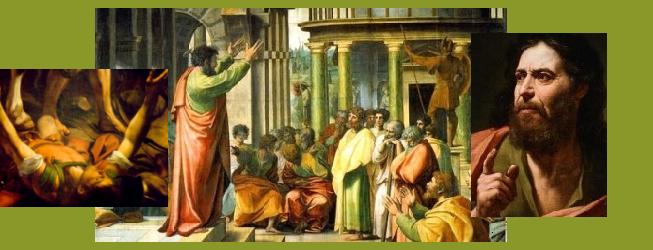St. Paul is the most important theologian in the history of the Church … since St. Paul first gave expression to many truths that are the basis of the Creed and the Catechism of the Catholic Church.
St. Paul’s conversion and addressing crowds in Athens
I have spent many hours preparing some homilies on the theology of St. Paul. My guide in this was Archbishop Fulton J. Sheen who said that he spent one hour of preparation for every minute of preaching. That study was most rewarding and gave me a few valuable insights into the thinking of St. Paul.
It is clear to me that St. Paul is the most important theologian in the history of the Church—with the possible exception of St. John the Evangelist, who was taught by Jesus himself—since St. Paul first gave expression to many truths that are the basis of the Creed and the Catechism of the Catholic Church.
The key to the theology of St. Paul is his personal encounter with the glorified Christ on his way to Damascus. That revelation, in which he was blinded for three days, changed Paul into a new man. The persecutor of Christ was changed into a zealous apostle to proclaim that Jesus is the promised Messiah, the Christ, that he is Lord (Kyrios), and the Son of God. Because he saw the glorified Christ, and listened to him, he was transformed from a Jewish rabbi, to a Christian rabbi. Paul saw Christ, he heard him, he was called by him, and he was sent by him to convert the world. In carrying out his calling and sending, he was destined to suffer much for the sake of Christ—rejection, hatred, scourging, shipwreck, imprisonment and, finally, beheading by the Romans.
Christ is the key to St. Paul. His theology is Christocentric. The Gospel according to St. Paul is that the Son of God became man in Jesus Christ, in order to reconcile all mankind to God the Father, by his life, passion, death and resurrection. For Paul, Christ is the glorified Christ, now reigning gloriously in heaven, and seated at the right hand of the Father.
Here are some of the main points in the theology of St. Paul: 1) Because of the sin of Adam, and each one’s personal sins, all men are sinners and in need of redemption (Rom. 3:23; 5:12-21). 2) In order to save mankind, God sent his Son into the world, born of a woman (Rom. 4:4), to make a fitting satisfaction for sin. 3) That Son is Jesus Christ, who communicates his grace, and justifies all who believe in him, and are baptized. 4) The grace of Christ includes the sending of the Holy Spirit, which constitutes the believer as an adopted child of God, a member of the body of Christ, and an heir of eternal life. 5) Christ Jesus is the fulfillment of all the prophecies of the Old Testament, and has established a New Covenant to replace that of Moses; therefore, Christians are not bound by the ceremonial and dietary laws, and circumcision, contained in the Law of Moses. This means that one does not have to become a Jew in order to be a Christian. This insight of Paul made Christianity into a religion open to all peoples (see 1 Tim. 2:4).
A recent author said that ideas have consequences. That certainly applies to the Christian faith. St. Paul argues—in most of his letters towards the end of his life—that faith in Christ demands a moral way of life based on the Ten Commandments, the law of nature, and the commandment of love of God and neighbor (Rom. 13:9-10). Here, he mentions regulations for bishops, elders, old men, old women, husbands and wives, parents and children, masters and slaves. Christians are to avoid sexual immorality, idolatry, and other vices of the pagans. They are to give good example, in word and deed, to all. He often insists on purity of doctrine, preaching and defending the deposit of faith from the Apostles, and refuting the errors of false teachers (1 & 2 Tim.; Tit.).
St. Paul is a giant among Christians. In most of his letters, he is thinking of the Second Coming of Christ. He urges all to be prepared for it, and to hope for it. It means that all those who share in the life of Christ, will enter into the heavenly Jerusalem, and be happy with Father, Son, and Holy Spirit forever, when Christ comes again in glory.

Dear Sir,
What about Paul’s saying that he didn’t receive his knowledge from the 12 apostles , but directly from Christ?
What about Paul saying there is only “one baptism” (is it water, or Spirit?)
Respectfully,
Gerald
The grace of inspiration to write as God willed was given to all of the writers of the entire Scripture including Paul from God. And for BaptismPaul indicates the Spirit of God with Sanctifying grace that is infused into the soul of a man. Paul maybe complex in some of his letters but there is always a way to explain him is from Theologians and Scripture exegetes as I am. Martin Drew Dallas Tx.